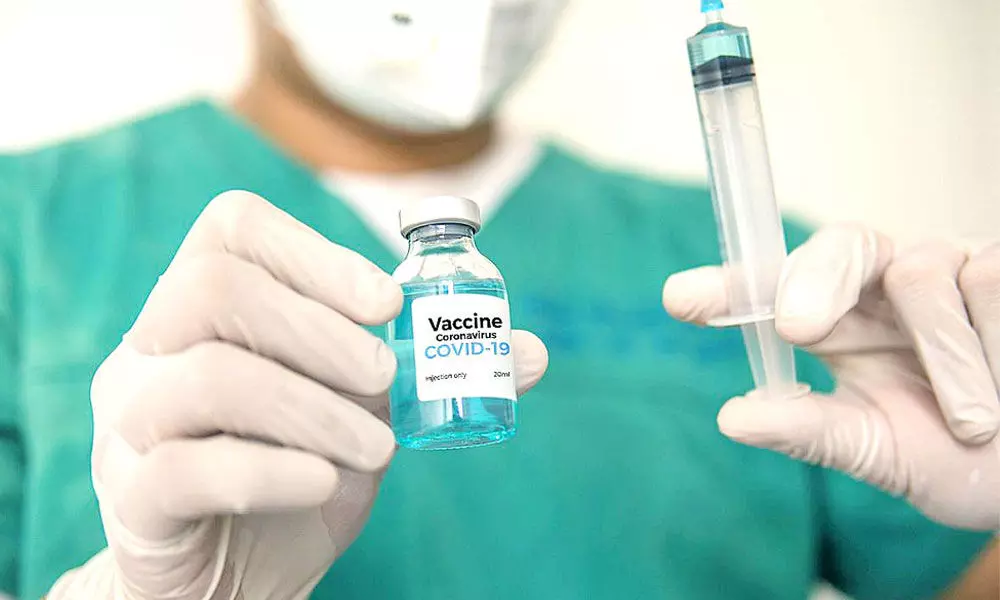Covid vaccine: Is it halal?
In spite of these flimsy or technical objections, Bahrain, Saudi Arabia, Bangladesh, Malaysia, Indonesia, the UAE and Pakistan, which claim to be Islamic majority countires have approved the vaccine
image for illustrative purpose

It's not only the Muslims, even Hindus and Jews have raised questions about the use of the Covid vaccine, due to prohibited substances in its composition.
Even before the Covid vaccination process starts in India.
The Indian Muslims have courted another controversy. The question is whether they'll be amenable to get vaccinated or not, as there are reports that the proposed vaccines may not be halal as per the Islamic dietary laws.
Muslims, Jews and even Hindus have questioned the composition of the proposed vaccines developed by Pfizer, Moderna, AstraZeneca and Bharat Biotech's Covaxin. Even as India is scrambling to start the coronavirus vaccination drive, Muslims have raised concern over the use of pork products -- forbidden in Islam and Judaism, while the Hindus have questioned the inclusion of cow blood in the vaccine.
Halal or haram
The vaccine manufacturers - Pfizer, AstraZeneca and Moderna - have rejected in vain the allegations of using pork gelatine. The manufacturers have clarified that pork products are not part of the vaccines, though pork-derived gelatine is known to be used as a stabiliser for safe storage and transportation of the vaccines.
The approved Covid-19 vaccines have met with a mixed response from the Islamic theological community, halal associations and halal pharmaceutical experts as to whether the vaccine is halal, despite various governments' approval, including those of many Muslim-majority countries. In the UK, the Pfizer-BioNTech vaccine, which is being given to the public, was approved by the British Islamic Medical Association (BIMA) and other Islamic scholars, stating the vaccine was halal "based on the information available."
According to the British government, the vaccine does not contain any components of animal origin, which has been a concern for Muslims as porcine, which is haram (non-permissible), or non-halal slaughtered beef could have been used.
However, the Standards and Metrology Institute for Islamic Countries (SMIIC), a unit of the Organisation of Islamic Countries (OIC), has so far, not officially stated that the vaccine is halal or not halal. Ihsan Ovut, the Secretary General of SMIIC, in an email to an Islamic website, said there is "no specific standard developed on the halal-ness of Covid-19 vaccines".
A halal pharmaceuticals expert says the vaccine cannot be claimed as halal if they are not halal-certified. But this 'No' is on technical grounds. According to Dr. Mohammed Ali Al Sheikh, who works at SMIIC, the halal certification has to be carried out by a competent third-party and cannot be claimed by a manufacturer itself, which Prizer did. It is an opinion seconded by the World Halal Authority (WHA).
Acceptance by Muslim countries
However, in spite of these flimsy or technical objections, Bahrain, Saudi Arabia, Bangladesh, Malaysia, Indonesia, the UAE and Pakistan, countries which claim to be Islamic or are Muslim-majority countries, have approved the Sinopharm vaccine, while Singapore's government has authorised the Pfizer-BioNTech vaccine for use in the country. This step must have been taken after considering the religious sensibilities and analysis of the composition of these vaccines.
In Singapore, which has a sizeable Muslim population, the Office of the Mufti of the Islamic Religious Council of Singapore (MUIS), stated on its website that the Covid-19 vaccine is "a basic necessity (daruriyyat)" as it is a life-saving inoculation. In Indonesia, the government has already said it will include the Muslim clerical body in the Covid-19 vaccine procurement and certification process.
Indian Ulema's view
In India, the controversy was stoked last week by Mumbai's Raza Academy, a Barelvi outfit, seeking details about all the vaccines being developed and whether they contain pork extract, from the WHO.
The Indian Islamic scholars, as usual are divided on the issue with the majority of them citing verses from the Holy Quran (Surah Nisa and Surah Baqara) to advocate for the vaccine, but not giving a clear-cut guidance to the Muslim populace.
Leading Islamic scholar Akhtarul Wasey, former professor of Islamic Studies at Jamia Millia Islamia, trying to put at rest the whole issue, opines that for Muslims pork and alcohol are not permissible for eating and drinking purposes, but if a part of these is used for medicinal purpose then it is allowed in Islam, as that medicine will be taken for the express purpose of saving life, which is allowed in Islam. Furthermore, he asserted that according to Islamic jurists a person suffering from hunger for more than three days and nearer to death is also allowed to eat the meat of a dead animal, in order to survive.
Prof. Wasey urged the Muslim Ulema to be more proactive in this regard and appreciated the stand taken by Deoband and Nadwa, the two leading Islamic seminaries in this regard. He also reiterated the fact that the Polio drive in India was completed successfully and the scourge of Polio in India was wiped out after the intervention of Indian Ulema. Jamaat-e-Islami Hind has become the first Muslim body in India to categorically state that Muslims are permitted to use the Coronavirus vaccines, even if they contain pork extracts, as it sought to dispel all rumours suggesting otherwise.

